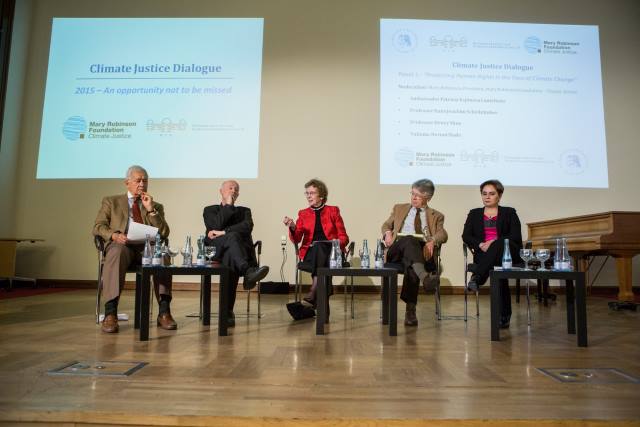On Monday, 13 April, ten members of the global High Level Advisory Committee to the Climate Justice Dialogue (HLAC) gathered for a public panel discussion at the Humboldt Universität zu Berlin to discuss a key challenge of our time – climate change.
The High Level Advisory Committee to the Climate Justice Dialogue (HLAC) is a group of diverse leaders and advocates who are united in the need for a strong and just response to climate change.
During the event titled “Climate Justice Dialogue: 2015 – An opportunity not to be missed”, hosted by the Mary Robinson Foundation – Climate Justice in partnership with the Potsdam Institute for Climate Impact Research (PIK), the panellists highlighted the need for a people centred approach to climate action and the protection of the human rights of all people.
Opening the dialogue, Mary Robinson, President, Mary Robinson Foundation – Climate Justice, who moderated the discussion, said:
“2015 could be a very historic year. In concluding the Post 2015 development agenda in New York this September and agreeing an ambitious, fair and legally binding climate agreement in December in Paris, our governments can set the world on path for a safer, more equitable future. This really is an opportunity not to be missed.”
The first panel explored issues around the protection of human rights in the face of climate change.
During the discussion, Henry Shue, Senior Research Fellow at Merton College and Professor of Politics and International Relations, University of Oxford, highlighted the need to protect people in the face of climate change, especially those most vulnerable such as future generations who have no voice no but who will have to live in the future we create today.
“We have a social institution to protect people in the face of climate change: it is called universal human rights.”
Talking about the challenges faced by people living in small island states, who are amongst the most vulnerable countries to climate change, Judge Tuiloma Neroni Slade, Former Secretary General, Pacific Islands Forum Secretariat, called for stronger leadership from all countries. He said:
“The science is getting clear and the evidence for immediate action is overwhelming – what is required is leadership.”
They were joined by Ambassador Patricia Espinosa Cantellano, Ambassador of Mexico to the Federal Republic of Germany and Professor Hans Joachim Schellnhuber, Director, Potsdam Institute for Climate Impact Research.
The second panel focused on discussing the requirements for a just transition and a fair and sustainable shift to a zero carbon, climate-safe economy.
“There are no jobs on a dead planet” said Sharan Burrow, General Secretary, International Trade Union Confederation, in the discussion. She called for steps to be taken now to make this transition and stated:
“Workers have a right to know what their government’s national plan is for phasing out carbon so they can be part of a just transition.”
She was joined by Nnimmo Bassey, Coordinator, Oilwatch International, who made a strong case for leaving fossil fuels in the ground and highlighted the need for finding alternatives. The need for alternatives to fossil fuels was picked up by Professor Kirit Parikh, Chairman, Integrated Research and Action for Development (IRADe), India, who said: “We need an international financial mechanism to make renewables competitive so that we have alternatives to current energy systems.”
Other panellists included Ravi Kanbur, TH Lee Professor of World Affairs, International Professor of Applied Economics and Management, Professor of Economics, Cornell University and Dessima Williams, Former Ambassador of Grenada to the United Nations.
Thanking the diverse group of leaders on the panel, Mary Robinson also applauded the audience for their engagement during the interactive session and urged the guests, especially the young people, to take action in 2015 for a fair and equitable climate agreement. She said: “Climate action is not just for governments and scientists – it is everyone’s business!”
Related Links
Climate Justice Dialogue – High Level Advisory Committee
Our work on equity and climate justice
HLAC Meeting 2014: Tackling Global Injustice in a World of Climate Change: Punishing the Innocent?
Declaration on Climate Justice


